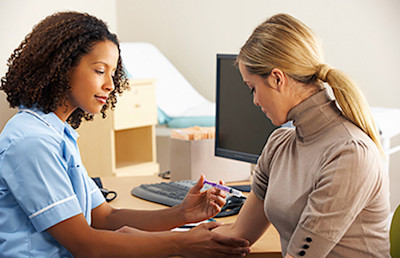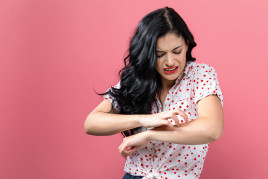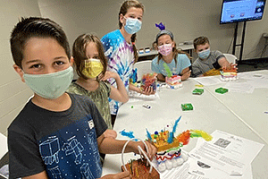Smallpox vaccine: What are the risks if someone has eczema?
Developing a health problem due to the smallpox vaccine is rare. Smallpox was wiped out more than 30 years ago, so the smallpox vaccine is no longer available to the public. A few people, however, still get this vaccine.
For anyone who has (or had) eczema, it’s important to take some precautions if a person close to you gets the smallpox vaccine.
Anyone who has (or had) eczema must take precautions around a person recently vaccinated against smallpox.

Who gets the smallpox vaccine?
The smallpox vaccine is given to:
Some (not all) people who serve in the military.
Researchers and lab workers who might be exposed to smallpox.
Vaccine safety
With the exception of the live smallpox vaccine, most vaccines are safe for a child who has eczema.
Live smallpox vaccine can lead to serious infection
One type of smallpox vaccine contains a live virus. This live vaccine can cause serious problems for anyone who:
Has eczema
Had eczema (even years ago)
Anyone who has (or had) eczema, should avoid:
Getting the live smallpox vaccine
Having skin-to-skin contact for about 30 days with anyone who gets the live smallpox vaccine
Skin-to-skin contact with someone who received the live smallpox vaccine can cause a serious infection known as eczema vaccinatum (EV). This infection develops in people who have (or had) eczema.
While EV is very rare today, it is important for anyone who has (or had) eczema to avoid skin-to-skin contact with anyone who receives the live smallpox vaccine. EV can be very serious.
It’s necessary to avoid skin-to-skin contact for about 30 days. This is how long it takes for the vaccinated area to scab and the scab to fall off.
Once the skin heals and the scab falls off, it’s safe to have skin-to-skin contact.
If you have skin-to-skin contact before the scab falls off:
Immediately wash your skin if skin-to-skin contact occurs.
Use soap and warm water to wash all skin that may have touched a recently vaccinated person.
Anyone who develops EV looks very ill and has a fever. These are signs that the person needs immediate medical care.
Related AAD resources
References
Reed JL, Scott DE, et. al. “Eczema Vaccinatum.” Clin Infect Dis. 2012 Mar;54(6):832-40.
Vellozzi C, Lane M, Averhoff F, et al. “Generalized vaccinia, progressive vaccinia, and eczema vaccinatum are rare following smallpox (vaccinia) vaccination: United States surveillance, 2003.” Clin Infect Dis. 2005; 41(5):689-97.
 Atopic dermatitis: More FDA-approved treatments
Atopic dermatitis: More FDA-approved treatments
 Biosimilars: 14 FAQs
Biosimilars: 14 FAQs
 How to trim your nails
How to trim your nails
 Relieve uncontrollably itchy skin
Relieve uncontrollably itchy skin
 Fade dark spots
Fade dark spots
 Untreatable razor bumps or acne?
Untreatable razor bumps or acne?
 Tattoo removal
Tattoo removal
 Scar treatment
Scar treatment
 Free materials to help raise skin cancer awareness
Free materials to help raise skin cancer awareness
 Dermatologist-approved lesson plans, activities you can use
Dermatologist-approved lesson plans, activities you can use
 Find a Dermatologist
Find a Dermatologist
 What is a dermatologist?
What is a dermatologist?
